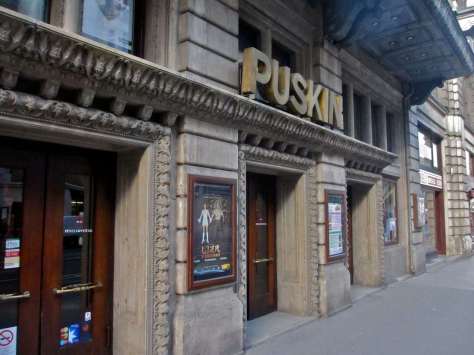Click on photos to enlarge.
Alexander Pushkin, as I have had plenty of opportunities to say, remains above the fray – whatever it is. Pushkin, I think I’ve written somewhere in this blog, can’t be sullied. And so it shouldn’t be all that surprising to find in Budapest a Pushkin cinema (or Puskin cinema, as it is spelled in Hungarian; still pronounced Pushkin). Someone could easily have come along in the last 25+ years and pulled that name down in order to put up another that would be more familiar and closer to home. That hasn’t happened, as you see. Squares and street names bearing the names of Russian “heroes” from the Soviet period have been changed. But Pushkin remains. This is an art house that shows old and “rare” films, so the name of one of the world’s great, elite poets fits well.
It’s interesting, though, that you can almost see a bit of the old Soviet-bloc era peeking through these pictures. The gray, colorless building, the sense of dilapidation, the sense of grandeur without anything really grandiose or extraordinary in the architecture – these are all little signs of the past. In that, this movie house is not alone in Hungary. I did a bit of Googling around and I found that a statue – a bust – of Pushkin stands in the town of Szombathely in a place called Brenner Park. Unfortunately, I’m not going to make it there on this trip, so I’ll have to settle for sending you to a small website if you’re interested in seeing pictures of the bust sculpted by János Farkas in 1950. (There is a gallery of 16 photos there to be had.) If I may allow myself to say so, it’s an abominable piece of sculpting. It’s not so much that I look more like Pushkin than this bust does – it is more that Pushkin looks like a dumb, sated, empty-headed moron. Surely I have never seen a less thoughtful, less insightful Pushkin in my life. Now, Farkas may one day come back at me and have the last laugh, because, of course, I haven’t the vaguest notion of what Pushkin actually looked like. Our perceptions are entirely determined by the paintings and drawings and sculptures that have come down to us. But it is also a fact that we have every right to expect Pushkin’s visage to have wit and wisdom in abundance, because we have read the poetry. We know his wit, his wisdom, his clarity, his beauty, his sense of proportion, his ability to take fabulous detours without ever losing the thread of his point. I just don’t believe that the guy Farkas sculpted could do any of that.
That, perhaps, is one of the beauties of having a cinema named after Pushkin. It is not an attempt to represent the poet, but merely to honor him. And that’s an admirable thing in a country and a city that experienced what it did during the so-called Hungarian Uprising of 1956. Only a few blocks from the Pushkin cinema you can find buildings that still bear the pockmarks from gunfire that was sprayed on buildings and human beings by Soviet soldiers sent by their government to stop a spontaneous freedom movement begun by students marching through the streets. According to Wikipedia some 2,500 Hungarians died in the nationwide conflicts that lasted from Oct. 23 to Nov. 10, 1956. Imagine what residents of Budapest thought – or might have thought – about the Puskin cinema in those days as they walked past. I don’t know, of course, if this movie house, located at Kossuth Lajos u. 18, was in place at that time. Judging by the looks of things, it could well have been. But let’s even say it was not. Imagine someone in Budapest, after that failed uprising, deciding to name their local movie house after a Russian poet. Yes, yes, there might have been official pressure, the need to appease Soviet overlords. But still, and still, and still… I say, taking into consideration all the complexities of history, it is a marvel that this place stands today. I’m sure few Budapest residents have the same sense of reverence or, at least, respect, for Pushkin that I have. And so they probably walk by this cinema paying it little or no attention whatsoever. They don’t think about Pushkin or Eugene Onegin or “I remember that marvelous moment” or the “Fountain of Bakhchisarai” or The Belkin Tales or Boris Godunov when they look at the name of the theater. They wonder what movies will be playing there soon. That’s great. That’s fine. But the fact remains: Pushkin is here and at home among the other astonishing treasures that Budapest has to offer.






